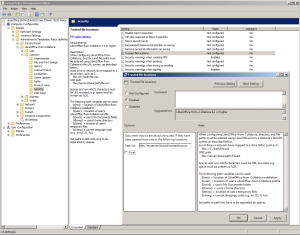Collabora Office can use configuration templates for easy deployment on Microsoft operating systems. Windows registry entries are automatically read and their settings applied each time the application starts. This provides administrators with efficient, fine-grained control of thousands of important settings, such as interface language, macro-security, and default file formats for saving.
ADMX Template for Collabora Office
We’ve prepared a template with the most useful settings, ready for easy deployment. Extensive documentation is included, explaining what each setting does.
If these files meet your needs, then your organisation would benefit from a Collabora enterprise support contract. The Document Foundation suggests deploying LibreOffice in enterprises and large organisations with support from certified professionals.
Instructions
- Download the template (.admx) and language (.adml) files
- Copy ADMX file from its download location to
%systemroot%\policyDefinitions - Copy English ADML file from its download location to
%systemroot%\policyDefinitions\en-US. Optionally copy localized ADML files to their respective language folder. - On Windows Server, open Group Policy Management
- Add a new Group Policy Object named Collabora-Office
- Link the new Group Policy Object to a computer group in your domain
- Select the Collabora-Office template for the Group Policy Object’s settings
Note: Collabora Office reads configuration data when the program first starts. Restarting Collabora Office will therefore be necessary if Group Policy changes are applied while it is running.
For more information watch the following video:
Download
- Collabora Office ADMX Template
- Collabora Office English (US) ADML file
- Collabora Office Italian ADML file by Studio Storti
- Collabora Office French ADML file by Thierry Boulestin – Ministère l’Écologie
- Collabora Office Hungarian ADML file by Gábor Kelemen
- Collabora Office German ADML file
- Collabora Office Spanish ADML file
- Collabora Office Turkish ADML file
- Collabora Office Portuguese (Brazil) ADML file
Community use, improvements, and translations
Templates can be easily translated. Please contribute translations to your native language on Transifex.
The templates are compatible with LibreOffice from The Document Foundation, as well as Collabora Office.
These files are licensed under a Creative Commons CC-BY-SA 4.0 licence. This means they can be freely used and distributed by anyone, with the requirement that the author notice inside the file is preserved, and modifications to the templates are shared under the same terms. See the human-readable version of the license on the Creative Commons website for details.


